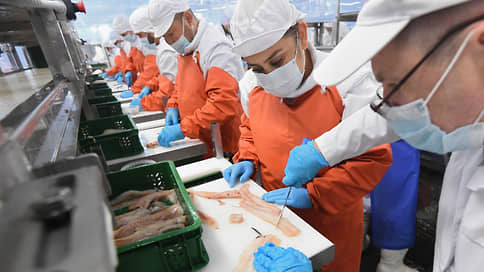Food market participants see risks in export restrictions
[ad_1]

The introduction of export duties of 4–7% tied to the ruble exchange rate could affect 46% of agricultural exports, and fees from market participants are estimated at 125 billion rubles. in year. Business complications are expected by fisheries producers, rapeseed and soybean processors and alcohol producers, while the measure will not affect the main positions of meat, dairy products and confectionery. The export of excluded items still requires efforts to develop, analysts explain.
The introduction of export duties on food tied to the ruble exchange rate could bring 125 billion rubles to the budget. additional fees per year, according to the Center for Economic Forecasting of Gazprombank. According to analysts, the mechanism affected 46% of agricultural exports, including fish and seafood, rapeseed and soybean oils, peas and legumes, alcoholic beverages, etc.
Export duties on a wide range of goods were introduced from October 1, 2023 to December 31, 2024 and apply to supplies outside the EAEU. Duties are set at 4–7% at an exchange rate of 80–95 rubles. per dollar, at an exchange rate of less than 80 rubles. per dollar the rates are zeroed. The mechanism does not affect wheat, barley, corn, and sunflower oil, the export of which is already limited by duties. Also, the new duties will not affect meat, key export items of dairy products, confectionery, flour, etc.
The main agricultural export subject to the new duties is fish and seafood. According to Agroexport, in 2022 the category accounted for 14% of total food exports of $41.6 billion. This is the third share after grains (32%) and oil and fat products (22%). The President of the All-Russian Association of Fisheries Industrialists (VARPE), German Zverev, points out that duties will worsen the competitive position of Russian crab, pollock fillets and cod in foreign markets, the sale of which in 2022 brought fishermen about 80% of export revenue.
The President of the Association of Pollock Harvesters, Alexei Buglak, says that on the pollock market, due to overproduction and reduced consumption, prices are falling and it will not be possible to pass on duties to buyers. The President of the Association of Fishing Fleet Shipowners, Alexey Osintsev, notes that duties will become an additional burden in the context of limited sales markets and increased fees for the extraction of aquatic biological resources.
According to the Chairman of the Fishing Union, Alexander Panin, with the introduction of duties, companies may even stop or sharply reduce production of some low-income items, the demand for which is limited within the Russian Federation. The Retail Trade Association said the restrictions could boost supply in the domestic fish market in the short term.
Kommersant’s interlocutor on the oil and fat market says that duties on the export of rapeseed and soybean oils threaten to stop the production of these products, since the profit of oil factories will be lower than the 7% duty, and these oils are not in demand in Russia. According to OleoScope, exports of all vegetable oils from the Russian Federation in the 2022/23 season increased by 33%, to 6.05 million tons. Supplies of rapeseed oil increased by 69%, to 1.52 million tons, soybean oil – by 18%, to 662 thousand tons.
Sovecon director Andrei Sizov notes that the growing interest in crops such as flax, chickpeas and peas, which are subject to new duties, is likely to decrease, as the restrictions will affect farmers’ incomes. General Director of the Institute for Agricultural Market Studies Dmitry Rylko says that if the measure becomes systemic, it will negatively affect the export of these crops in future seasons.
President of the Union of Alcohol Producers (SPAP) Igor Kosarev points out that due to the ban on the supply of Russian vodka to many Western markets, alcohol exports from the Russian Federation have already decreased by 70%, and investments in marketing are needed in new markets such as India and China. According to SPAP estimates, the duty will amount to about 17% of the cost of vodka and will greatly complicate exports.
Director of Yakov and Partners Oleg Shenderyuk says that the inclusion or exclusion of food from the mechanism is apparently related to the balance of markets. For fishing producers, export is a priority, and the Russian market is less interesting due to limited demand, and exports occupy a small part in meat production. Vice President, Head of the Analytical Department of Gazprombank Daria Snitko notes that the export of many food items excluded from the mechanism still requires efforts to develop, so the restrictions could be harmful.
The Ministry of Agriculture told Kommersant that goods whose exports could be negatively affected by duties are excluded from the mechanism, and the export of fish and seafood remains highly profitable at the current dollar exchange rate. Rosrybolovstvo added that the duties will help maintain the ratio of export volumes to domestic supply and should protect consumers from rising prices.
[ad_2]
Source link





